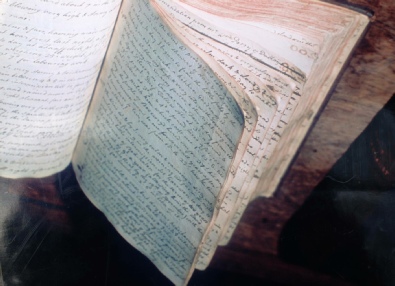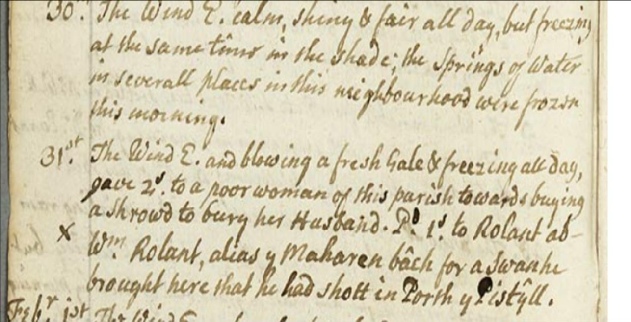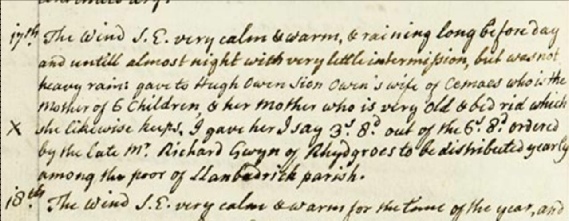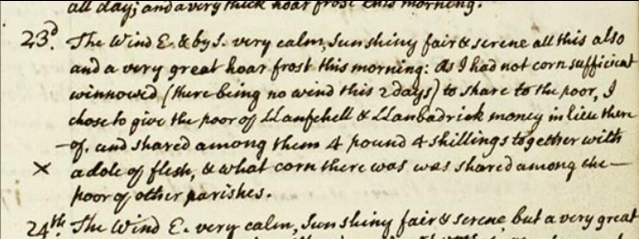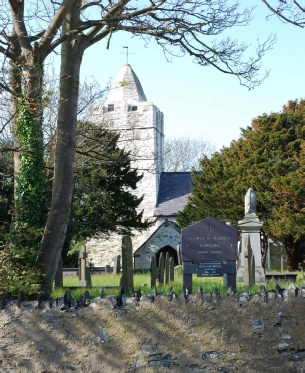
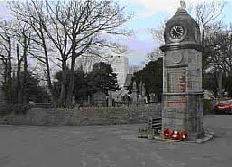
Cymdeithas Hanes Mechell

The Demography of Llanfechell 1851 & 1901
William Bulkeley and the poor of Llanfechell
Llanfechell in the early 19th Century
The diaries of William Bulkeley of Brynddu, written between 1735 and 1760, offer
a cornucopia of insights into the routine social life of eighteenth-
Llanfechell
Brynddu
Especially interesting are entries relating to the poor and destitute of the village of Llanfechell, and how the community tried to provide for them. In much of England and Wales of this period, the provisions of the Poor Law were relied upon – but not in Anglesey. Here no poor rate was collected, and there were no workhouses. Instead, the welfare of the poor was left to the immediate charity and generosity of fellow members of the community.
There were essentially three ways in which such funds found their way to the poor – (1) through private giving by individuals; (2) through small charities endowed specifically to provide local poor relief; and (3) through church collections.
William Bulkeley’s diary
William Bulkeley’s diaries make frequent mention of all three of these methods.
(Note: 1s (one shilling) in 1750 corresponds to roughly £6 in 2014 money.)
(1) Private giving
The diarist himself appears repeatedly to have been spontaneously generous to individuals. For example:
‘… gave 1s charity to a poor man that had a loss of his only cow.’
18 August 1740
‘…Gave a Guinea to an old Gentlewoman, a Clergyman’s widdow distress’d with poverty’.
13 December 1755
‘…gave 2s to a poor woman of this parish toward buying a shrowd to bury her husband’
31 January 1740
‘…Pd. Into the hands of Ann and Huw Lewys 5s. towards her care and trouble in nursing a Grandchild of hers, being one of three left destitute of help and comfort by the death of his mother. I engaged to give her 5s. more again, besides what she shall have of meat in the house when she comes here, and if I can likewise engage the charity of the parishioners to give her some relief.’
16 February 1740
(2) Local charities
Moreover, we know from the Report of Lord Brougham’s Commission into North Wales
charities (1818-
‘…gave to Hugh Owen, Sion Owen’s wife, of Cemaes who is the mother of 6 children,
& her mother who is very old & bed-
17 December 1751
‘..as I had not corn sufficient winnowed (there being no wind this 2 days) to share to the poor, I chose to give to the poor of Llanfechell & Llanbadrick money in lieu thereof, and shared among them 4 pound 4 shillings together with a dole of flesh, & what corn there was shared among the poor of other parishes.’
Sometimes the fulfilment of charitable obligations required him to supervise the production of clothes for distribution:
‘I had today about 80 women at work, some spinning, some carding and some combing of the yarn designed by help of God to make cloaths for the poor people of this parish and some perhaps of Llanbadrick, there being 41 wheels and the rest carders and winders.’
28 July 1757
It is clear that formally constituted charities of this kind brought with them significant annual obligations for the diarist and the rector, as leading figures in the parish.
(3) Church collections
However, most of the fund-
Moreover, the numerous entries in Bulkeley’s diaries allow us to distinguish between general church collections made for the poor, and more targeted collections directed at specific individuals deemed worthy of support.
The Church of St Mechell
The general collections became more substantial as the century advanced, as the plight of the poor worsened:
‘…this day being Easter Eve there was a collection for the poor of the parish after the sacrament, 4s collected, about 60 communicated this day. I gave a shilling to the collection….
13 April 1734’
‘…209 persons communicated this day. Gave 10s 6d to a collection for the poor of this parish & there was collected 20s 9d.’
Easter Day, 10 April 1757
On the other hand, specific collections were made in support of particular named persons, who had to present a brief in support of their case, which was read out to the congregation:
‘…gave 6d to a Charity Collection for a poor bed-
24 May 1741
‘…gave 2s 6d to a collection for a poor man of Llanrhwydrys who had himself & whole family, wife & 8 children been sick & reduced to great poverty.’
2 February 1740
‘…gave 2s to a collection made this evening for a poor Cripple boy to put him out an apprentice to a taylor’.’
30 March 1755
‘…gave 6d to a charity Collection for a man of Rhosbeirio that lost all he had by fire.’
22 January 1738
Overall, these were very hard times for the poor. But the Bulkeley diaries throw
light on the positive way in which a local community like Llanfechell approached
its obligations to less fortunate neighbours in the mid-
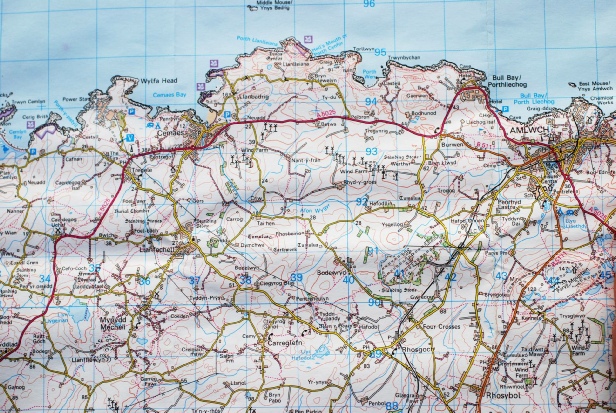


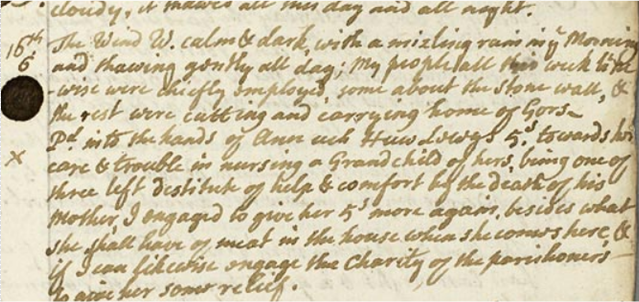
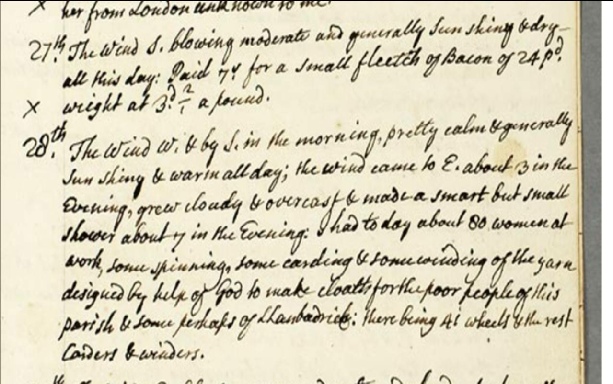


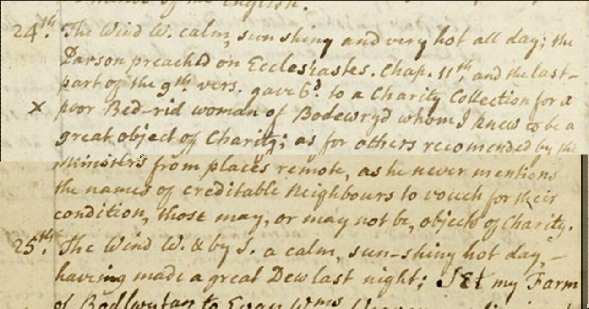
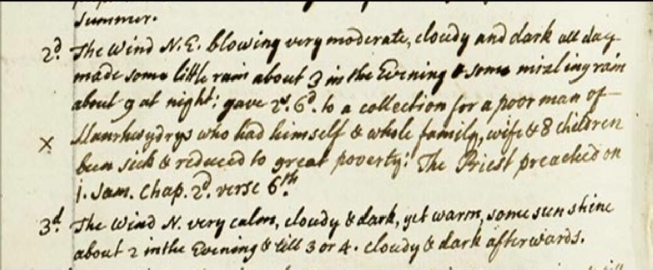
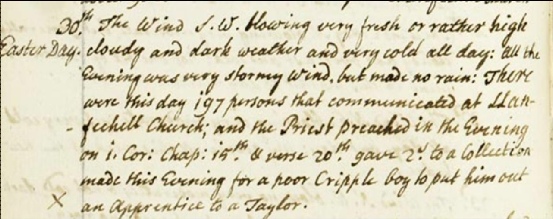
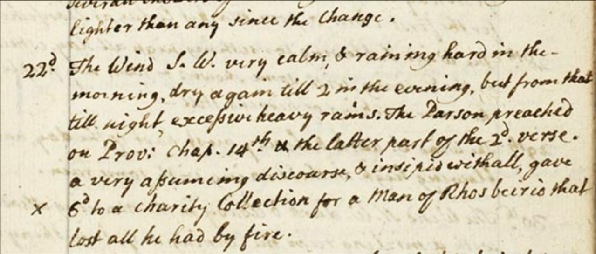
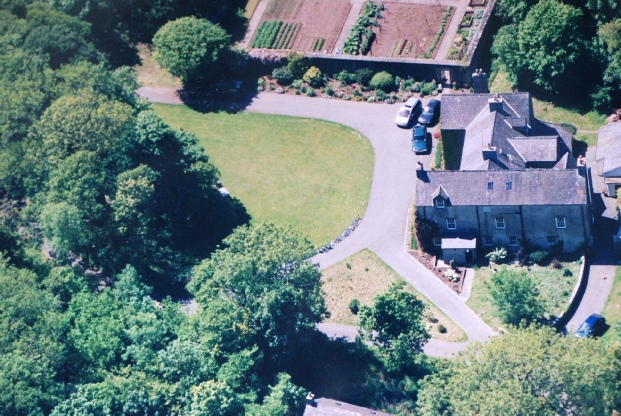
click on all images to see larger versions
